I am trying to get the user account control properties using library Novell.Directory.Ldap in ASP .NET Core 5. When I search the users attributes I found the attribute name userAccountControl which is set to some number. After searching solution I am able to find:
bool isUserActive = false;
bool userMustChangePassword = false;
bool passwordNeverExpires = false;
bool passwordCannotBeChanged = false;
var flags = Convert.ToInt32(attributeSet.GetAttribute("userAccountControl").StringValue);
isUserActive = !Convert.ToBoolean(flags & 0x0002); //1. checks if user is enabled
if ((flags == 66048)) //65536+512
{
passwordNeverExpires = true; //2. Password never expires property
}
long value = Convert.ToInt64(attributeSet.GetAttribute("pwdLastSet").StringValue);
if (value == 0)
{
userMustChangePassword = true; //3. User must change password at next login
}
But I am not able to figure out how to get the User cannot change password and if the account is locked properties? Or how can I compare the binary value like 0x0040? Please help
Edit:
I tried the steps given by @Gabriel Luci in https://www.gabescode.com/active-directory/2019/07/25/nt-security-descriptors.html and tried following code:
var act = attributeSet.GetAttribute("nTSecurityDescriptor").ByteValue;
ADsSecurityUtility secUtility = new ADsSecurityUtility();
IADsSecurityDescriptor convertAttrToSD = (IADsSecurityDescriptor)secUtility.ConvertSecurityDescriptor(act, (int)ADS_SD_FORMAT_ENUM.ADS_SD_FORMAT_RAW, (int)ADS_SD_FORMAT_ENUM.ADS_SD_FORMAT_IID);
var byteArray = (byte[])secUtility.ConvertSecurityDescriptor(
convertAttrToSD,
(int)ADS_SD_FORMAT_ENUM.ADS_SD_FORMAT_IID,
(int)ADS_SD_FORMAT_ENUM.ADS_SD_FORMAT_RAW
);
var security = new CommonSecurityDescriptor(true, true, byteArray, 0);
If I check the security it shows 
I am not getting where to look user cannot change the password settings?
Edit 2: According to @Gabriel Luci updated answer, it worked for me like this:
var constraints = new LdapSearchConstraints();
constraints.SetControls(new LdapControl("1.2.840.113556.1.4.801", true, new byte[] { 48, 3, 2, 1, 7 }));
var getNtSecurityByteValue=attributeSet.GetAttribute("nTSecurityDescriptor").ByteValue;
var security = new CommonSecurityDescriptor(true, true, getNtSecurityByteValue, 0);
var self = new SecurityIdentifier(WellKnownSidType.SelfSid, null);
var userChangePassword = new Guid("AB721A53-1E2F-11D0-9819-00AA0040529B");
foreach (var ace in security.DiscretionaryAcl)
{
if(ace.GetType().Name == "ObjectAce")
{
ObjectAce objAce = (ObjectAce)ace;
if (objAce.AceType == AceType.AccessDeniedObject && objAce.SecurityIdentifier == self && objAce.ObjectAceType == userChangePassword)
{
cannotChangePassword = true;
break;
}
}
}